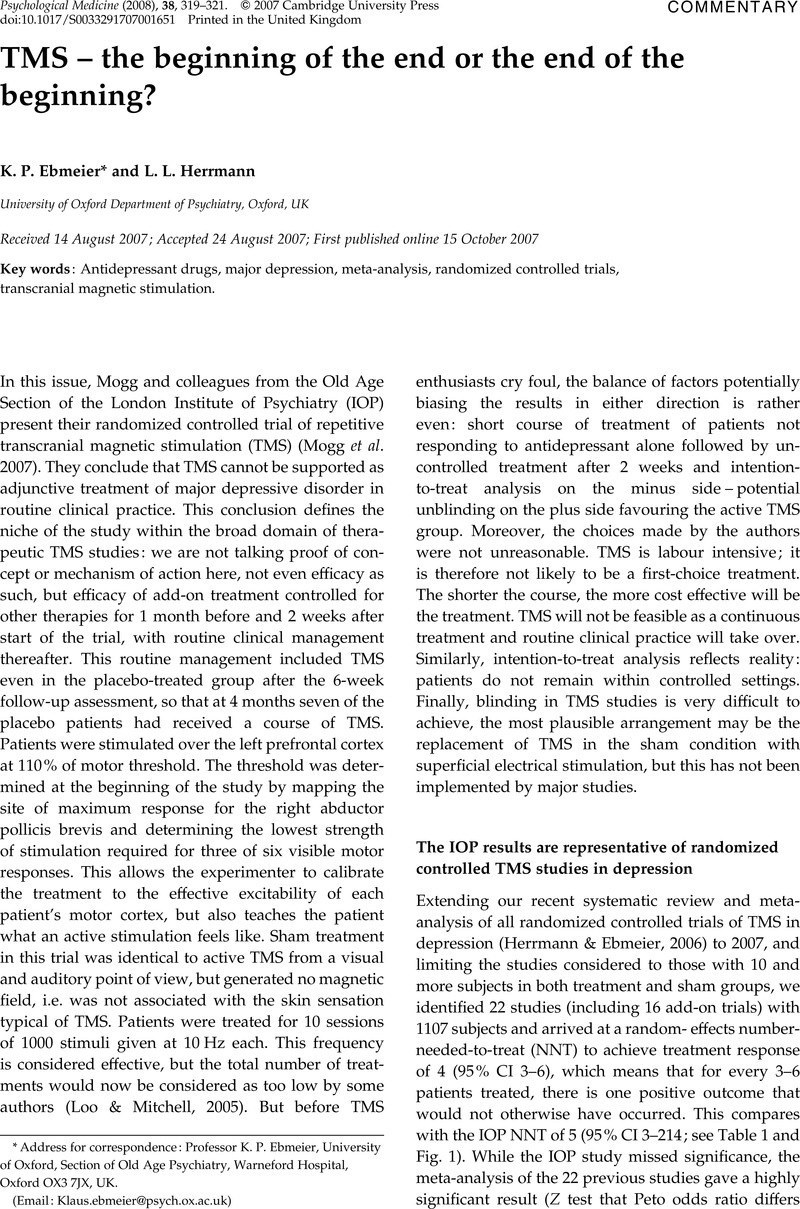Crossref Citations
This article has been cited by the following publications. This list is generated based on data provided by Crossref.
2009.
Review: high frequency repetitive transcranial magnetic stimulation improves symptoms of major depression.
Evidence Based Mental Health,
Vol. 12,
Issue. 3,
p.
80.
Pompili, Maurizio
Rihmer, Zoltán
Innamorati, Marco
Lester, David
Girardi, Paolo
and
Tatarelli, Roberto
2009.
Assessment and treatment of suicide risk in bipolar disorders.
Expert Review of Neurotherapeutics,
Vol. 9,
Issue. 1,
p.
109.
Price, Gregory W.
Lee, Joseph W.Y.
Garvey, Carrie-Anne L.
and
Gibson, Nathan
2010.
The use of background EEG activity to determine stimulus timing as a means of improving rTMS efficacy in the treatment of depression: A controlled comparison with standard techniques.
Brain Stimulation,
Vol. 3,
Issue. 3,
p.
140.
Sobiś, Jarosław
Jarząb, Magdalena
Hese, Robert Teodor
Sieroń, Aleksander
Zyss, Tomasz
Gorczyca, Piotr
Gierlotka, Zbigniew
Pudlo, Robert
and
Matysiakiewicz, Jerzy
2010.
Therapeutic efficacy assessment of weak variable magnetic fields with low value of induction in patients with drug-resistant depression.
Journal of Affective Disorders,
Vol. 123,
Issue. 1-3,
p.
321.
Paillère Martinot, Marie-Laure
Galinowski, André
Ringuenet, Damien
Gallarda, Thierry
Lefaucheur, Jean-Pascal
Bellivier, Frank
Picq, Christine
Bruguière, Pascale
Mangin, Jean-François
Rivière, Denis
Willer, Jean-Claude
Falissard, Bruno
Leboyer, Marion
Olié, Jean-Pierre
Artiges, Eric
and
Martinot, Jean-Luc
2010.
Influence of prefrontal target region on the efficacy of repetitive transcranial magnetic stimulation in patients with medication-resistant depression: a [18F]-fluorodeoxyglucose PET and MRI study.
The International Journal of Neuropsychopharmacology,
Vol. 13,
Issue. 01,
p.
45.
Croarkin, Paul E.
Wall, Christopher A.
McClintock, Shawn M.
Kozel, Frank Andrew
Husain, Mustafa M.
and
Sampson, Shirlene M.
2010.
The Emerging Role for Repetitive Transcranial Magnetic Stimulation in Optimizing the Treatment of Adolescent Depression.
The Journal of ECT,
Vol. 26,
Issue. 4,
p.
323.
Lepping, P.
Schönfeldt‐Lecuona, C.
Sambhi, R. S.
Lanka, S. V. N.
Lane, S.
Whittington, R.
Leucht, S.
and
Poole, R.
2014.
A systematic review of the clinical relevance of repetitive transcranial magnetic stimulation.
Acta Psychiatrica Scandinavica,
Vol. 130,
Issue. 5,
p.
326.



